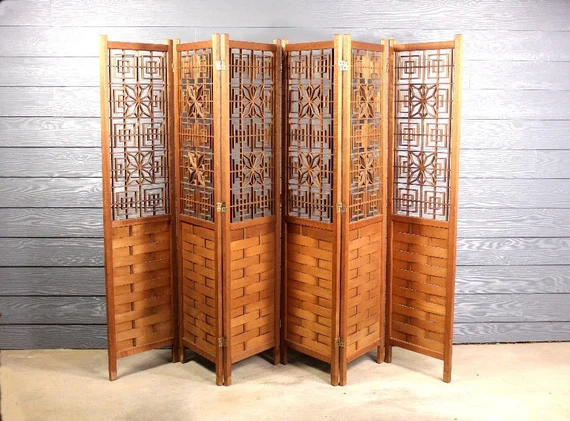The folding screen, a classic piece of furniture, has been used for centuries to create privacy, divide spaces, or simply add a decorative element to a room. With its versatility and adaptability, the folding screen can be tailored to suit any home décor.
History and Evolution of Folding Screens
The history of folding screens can be traced back to ancient civilizations, where they were used as portable partitions or privacy screens. Over time, folding screens evolved into more elaborate and decorative pieces of furniture, incorporating features such as intricate carvings, painted designs, and luxurious fabrics.
Types of Folding Screens
Folding screens come in a wide variety of styles, sizes, and materials to suit different needs and aesthetics. Some of the most common types of folding screens include:
- Wooden folding screens: Wooden folding screens offer a natural and warm look. They can be made from a variety of woods, such as oak, maple, cherry, and walnut.
- Fabric folding screens: Fabric folding screens are a versatile and lightweight option that can be used to create privacy or divide spaces. They come in a variety of colors and patterns.
- Metal folding screens: Metal folding screens are a modern and durable option. They can be made from various metals, such as steel, iron, or brass.
- Paravans: Paravans are a type of folding screen that consists of multiple panels that can be arranged in various configurations. They are often used to create private spaces within a larger room.
- Shoji screens: Shoji screens are Japanese folding screens made from wood and paper. They are known for their simple and elegant design.
Folding Screen Materials
Folding screens can be made from a variety of materials, including:
- Wood: Wooden folding screens offer a natural and warm look. Popular wood choices include oak, maple, cherry, and walnut.
- Fabric: Fabric folding screens can be made from a variety of materials, such as cotton, linen, or silk.
- Metal: Metal folding screens are a modern and durable option. They can be made from various metals, such as steel, iron, or brass.
- Paper: Paper folding screens, such as shoji screens, offer a lightweight and translucent option.
Choosing the Right Folding Screen
When selecting a folding screen, consider the following factors:
- Size: The folding screen should be the right size for the space where it will be used.
- Style: The folding screen’s style should complement the overall décor of the room.
- Functionality: Consider whether you need a folding screen for privacy, space division, or simply as a decorative element.
- Materials: Choose materials that are durable and match your personal style.
The folding screen is a versatile and stylish piece of furniture that can add both functionality and aesthetic appeal to your home. By carefully considering your needs and preferences, you can choose the perfect folding screen to complete your space.

